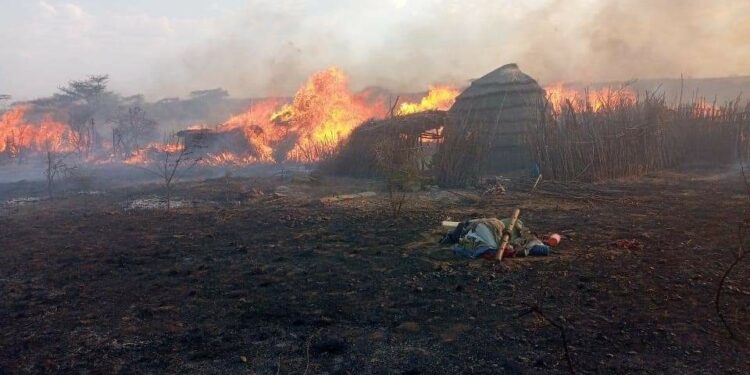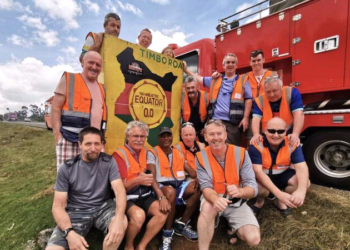A desperate attempt by young boys to hunt wild rats for food in Lorengedwat Sub-County, Nabilatuk District, ended in disaster on Saturday, December 28, 2024, when a wildfire engulfed three villages, leaving over 1,000 people homeless and causing destruction worth millions of shillings.
The fire ravaged Naweet, Modern, and Lonangat villages, reducing homes, crops, and vital food supplies to ashes. The fire broke out around 11:00 a.m. and quickly spread across the dry, wind-swept terrain. According to local authorities, the blaze raged uncontrollably for four hours before it was eventually contained, though the damage was already extensive. Emmanuel Longes, the LC3 Chairperson of Lorengedwat Sub-County, confirmed that while no lives were lost, the aftermath was catastrophic.
The fire is believed to have been started by a group of young boys who, in the midst of a severe food crisis, set fire to the dry bush in a bid to flush out wild rats. This practice, common in the region where food scarcity is a pressing issue, quickly spiraled out of control. The flames spread rapidly, fueled by the strong winds that swept through the area.
The destruction was swift. In addition to burning homes, the fire also destroyed crucial food supplies, leaving families with nothing.
The wildfire left thousands displaced, many now taking refuge along the Moroto-Nakapiripirit road. Local police, including SP Lewis Mugwisagye of Nabilatuk District Police Station, rushed to the scene to assist. “Our officers arrived as quickly as possible, but by the time we got there, the fire had already spread across vast areas,” Mugwisagye said. “We did everything we could, but the scale of the disaster was overwhelming.”
The situation is particularly dire given the ongoing food insecurity in Karamoja. For years, the region has been grappling with hunger due to drought, poor harvests, and limited access to resources. In the face of this crisis, families have been forced to rely on hunting wild rats as a source of food.
Mike Longole, the spokesperson for Karamoja Regional Police, noted that such methods of survival have become increasingly dangerous as droughts and famine worsen. “What was meant to be a simple attempt to gather food turned into a tragic disaster,” Longole stated. “We urge residents to be mindful of the risks, especially during such a severe hunger crisis.”
While local leaders have called for urgent assistance, including food and emergency supplies, the long-term challenges of hunger and poverty in Karamoja remain pressing. Paul Lokol, the LC5 Chairperson of Nabilatuk District, echoed the call for immediate intervention, highlighting that the fire has exposed the vulnerability of the region’s residents.
As the embers of the fire smolder, the reality of Karamoja’s food insecurity and the risks faced by its residents are clearer than ever. While the immediate need for food, shelter, and medical assistance is critical, the tragedy also underscores the urgency of addressing the region’s deep-rooted hunger crisis and the need for sustainable long-term solutions.
Do you have a story in your community or an opinion to share with us: Email us at editorial@watchdoguganda.com













